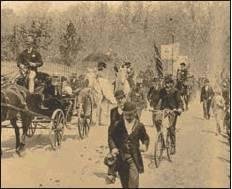It was the first ‘March on Washington’
MARK POWELL’S
HOLY COW!
HISTORY
Another presidential election year is upon us. And sooner or later, some group just may stage a march on Washington …
This item is available in full to subscribers.
Subscribe to continue reading. Already a subscriber? Sign in
Get 50% of all subscriptions for a limited time. Subscribe today.
Please log in to continueNeed an account?
|
It was the first ‘March on Washington’
MARK POWELL’S HOLY COW! HISTORY
Another presidential election year is upon us. And sooner or later, some group just may stage a march on Washington as a massive PR stunt.
More than 125 years ago, another group made its way on foot across this country. Although it didn’t achieve anything its participants sought, it did cause quite an uproar. And it concluded with an incident that created a popular phrase.
This is the forgotten tale of Coxey’s Army.
The economy suffered a nasty downturn in the Panic of 1893. It was the nation’s worst financial crisis until then. Millions of working people were suddenly unemployed. Suffering was widespread and severe.
Some folks wanted immediate action from Washington. They demanded Congress pass a bill authorizing $500 million to build roads and other public works projects to create jobs and get money circulating again. (Think of it as a forerunner of FDR’s New Deal some 40 years later.) And they wanted Congress to do it ASAP.
Jacob Coxey was one of the idea’s most enthusiastic backers. A 40-year-old sand quarry owner in Massillon Ohio, he was a dedicated Populist with a witty turn of phrase. Though friends and family considered him something of an oddball, his belief that Congress should act to end suffering was sincere.
Coxey proposed a radical plan: he would personally lead unemployed men to Washington where they would march to the Capitol and issue their demands to congressional movers and shakers.
It’s likely the idea didn’t originate with Coxey. Some three dozen groups of out-of-work men around the country were proposing similar steps. But Coxey was among the first, and because he was so quotable his effort received the lion’s share of news coverage.
Coxey grandly christened his effort the Army of the Commonwealth In Christ. The press dubbed it Coxey’s Army. When they set out from Massillon on Easter Sunday 1894, Coxey was at the head of 100 men, confidently predicting their ranks would swell to 100,000 by the time they reached Washington. His young wife and son Legal Tender Coxey (yes, that was the poor kid’s real name) went with him.
It was a madcap, haphazard affair from the start. In that time long before social media, it was difficult to get the word out and organize. So different groups started for Washington at different times. As for logistics, planning wasn’t Jacob Coxey’s forte. He seemed to improvise as the group moved from town to town by foot, camping outdoors and feasting on whatever food local supporters provided.
New recruits came in as other protesters dropped out. The whole thing was ragtag from start to finish. But it did generate a lot of news coverage. In the age of Yellow Journalism, newspapers eagerly covered the march. Many reports were derisive. The country was laughing at Coxey’s Army as it plodded eastward. Yet there was also silent anxiety under the surface, a fear that perhaps the marchers would
unleash social forces that would be impossible to control.
But things didn’t turn out that way. Barely 500 men were with Coxey when his “army” sauntered into Washington. Just as they were about to present their demands to Congress, Coxey was arrested for walking on the grass on the Capitol lawn. Exhausted, tired of being the butt of jokes, and now leaderless, the men finally had enough. They quietly disbanded and went home.
However, seeds were sown that eventually bore fruit. Coxey’s Army is considered the first march on Washington, a tactic later protest groups refined and used to mobilize popular support. Although the federal action Coxey and his army sought didn’t happen, the experience triggered discussion about government’s role in economic crisises.
Finally, Coxey was ridiculed as “Keep Off the Grass Coxey.” That nickname led to a poplar phrase that’s still used today: “Keep off the grass.”
You never know what unintended consequences a good protest may produce.
Have comments, questions or suggestions you’d like to share with Mark? Message him at jmp.press@gmail.com .
Other items that may interest you










Comments
No comments on this item Please log in to comment by clicking here